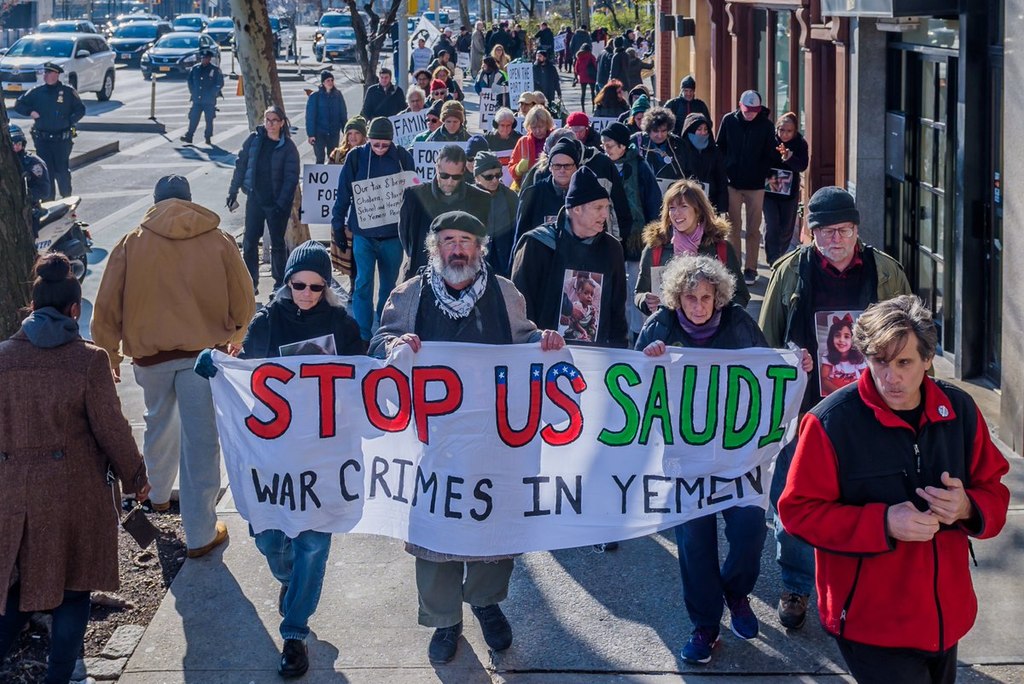Posted by: John Phoenix

On Feb 13, the U.S. House of Representatives advanced a resolution that would force the Trump administration to abandon its support for the Saudi coalition’s genocidal war in Yemen. The measure does not address the United States government’s own undeclared war in Yemen, which a specific exclusion in the resolution would allow to continue unabated.
Representatives voted 248 to 177 to invoke the War Powers Act of 1973, which forbids U.S. armed forces from remaining in military actions for longer than 60 days without explicit congressional approval. While numerous U.S. presidents have flagrantly violated the War Powers Act, Congress has never before asserted its power to force the U.S. military to exit a conflict.
The Senate approved the measure in December 2018 with bipartisan support but due to a cynical procedural maneuver the House didn’t vote on it before the session ended so the resolution must be voted on again by the Senate, where it is again anticipated to pass. Trump is expected to veto the measure.
The possibility of the U.S. war machine ending its logistical and financial support for this genocidal war is a significant, positive development. The U.S. provides the Saudi coalition with intelligence, weapons and direct arms sales to the country, including the bomb that fell on a bus of Yemeni school children in August 2018, killing dozens. Reports by CNN and Amnesty International last week illustrate the extent to which the United Arab Emirates in particular, a close Saudi ally, has used the plentiful arms supplied to it by Western powers as bargaining chips to win the loyalty of militias in Yemen, including Al-Qaeda in the Arabian Peninsula.
If U.S. support for the Saudi war were to end, it would be a great victory for Yemeni self-determination and the global struggle of solidarity with the Yemeni people against this brutal war.
The resolution reads:
“Congress hereby directs the President to remove United States Armed Forces from hostilities in or affecting the Republic of Yemen, except United States Armed Forces engaged in operations directed at al-Qaeda or associated forces, by not later than the date that is 30 days after the date of the enactment of this joint resolution (unless the President requests and Congress authorizes a later date), and unless and until a declaration of war or specific authorization for such use of United States Armed Forces has been enacted. For purposes of this resolution, in this section, the term ‘hostilities’ includes in-flight refueling of, non-United States aircraft conducting missions as part of the ongoing civil war in Yemen.”
The “operations directed at Al-Qaeda” were approved by Congress long ago. Back in September of 2001, just a week after the September 11 terrorist attacks, then-President George W Bush signed the 2001 Authorization for Use of Military Force Against Terrorists. The AUMF effectively grants the president broad authorization to use “force against those nations, organizations or persons he determines planned, authorized, committed, or aided the terrorist attacks that occurred on September 11, 2001.”
The U.S. has used this vague language to engage in military action in Yemen since 2002 against numerous forces that may or may not be related to al-Qaeda. Presently as a result of the civil war, AQAP controls a stretch of territory in eastern Yemen, where it is only one among many militias receiving either tacit or direct support from the Saudi-led coalition, which also includes the UAE and Sudan.
Many Yemenis reject the characterization of the war in their country as being a “civil war.” What is happening right now is a war conducted by a foreign power interfering in the internal affairs of a sovereign nation. It is an attempt to uphold Abdrabbuh Mansur Hadi–who has not set foot inside the country since 2015 and who supports the genocidal bombing campaign– as the “legitimate” president of the Yemen, despite that even with outside military support, the Houthis control the most populous parts of the country.
In supporting the resolution to end U.S. support for the Saudi coalition war in Yemen, we express our unconditional solidarity with the Yemeni people against all foreign interference in their internal affairs.
U.S. out of the Middle East!



